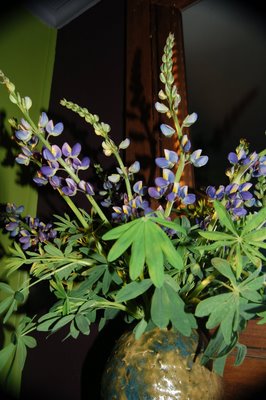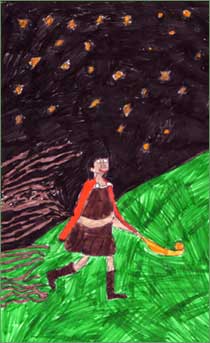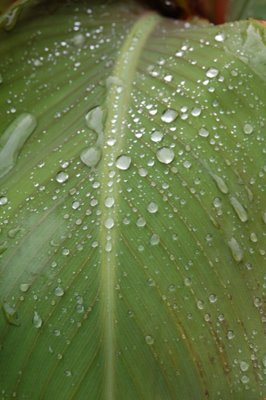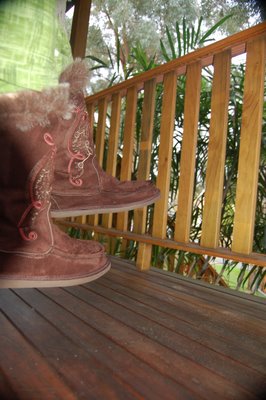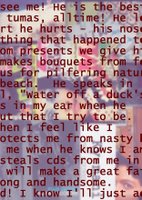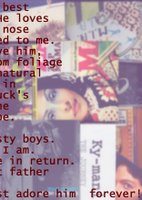Thursday, June 29
Wednesday, June 28
Monday, June 26
So far, Clarissa is compelling, heartbreaking, disturbing and impassioned and I have only read the first 256 pages. I have 1243 to go. Reading this novel is going to be a life project, yet I'm sure it will be worth it. Here's but a taste of the literary goodness the materful Richardson has created:
MISS CLARISSA HARLOWE, TO MISS HOWEMONDAY MORNING, MARCH 27.
This morning early my uncle Harlowe came hither. He sent up the enclosed very tender letter. It has made me wish I could oblige him. You will see how Mr. Solmes's ill qualities are glossed over in it. What blemishes does affection hide!--But perhaps they may say to me, What faults does antipathy bring to light!
.
Be pleased to send me back this letter of my uncle by the first return.
.
SUNDAY NIGHT, OR RATHER MINDAY MORNING.
I must answer you, though against my own resolution. Every body loves you; and you know they do. The very ground you walk upon is dear to most of us. But how can we resolve to see you? There is no standing against your looks and language. It is our loves makes us decline to see you. How can we, when you are resolved not to do what we are resolved you shall do? I never, for my part, loved any creature, as I loved you from your infancy till now. And indeed, as I have often said, never was there a young creature so deserving of our love. But what is come to you now! Alas! alas! my dear kinswoman, how you fail in the trial!
. .I have read the letters you enclosed. At a proper time, I may shew them to my brother and sister: but they will receive nothing from you at present.
. .For my part, I could not read your letter to me, without being unmanned.How can you be so unmoved yourself, yet so able to move every body else? How could you send such a letter to Mr. Solmes? Fie upon you! How strangely are you altered!
. .Then to treat your brother and sister as you did, that they don't care to write to you, or to see you! Don't you know where it is written, That soft answers turn away wrath? But if you will trust to you sharp-pointed wit, you may wound. Yet a club will beat down a sword: And how can you expect that they who are hurt by you will not hurt you again? Was this the way you used to take to make us all adore you as we did?--No, it was your gentleness of heart and manners, that made every body, even strangers, at first sight, treat you as a lady, and call you a lady,though not born one, while your elder sister had no such distinctions paid her. If you were envied, why should you sharpen envy, and file upits teeth to an edge?--You see I write like an impartial man, and as one that loves you still.
. .But since you have displayed your talents, and spared nobody, and moved every body, without being moved, you have but made us stand the closer and firmer together. This is what I likened to an embattled phalanx, once before. Your aunt Hervey forbids your writing for the same reason that I must not countenance it. We are all afraid to see you, because we know we shall be made as so many fools. Nay, your mother is so afraid of you, that once or twice, when she thought you were coming to force yourself into her presence, she shut the door, and locked herself in, because she knew she must not see you upon your terms, and you are resolved you will not see her upon hers.
. .Resolves but to oblige us all, my dearest Miss Clary, and you shall see how we will clasp you every one by turns to our rejoicing hearts. If the one man has not the wit, and the parts, and the person, of the other, noone breathing has a worse heart than that other: and is not the love of all your friends, and a sober man (if he be not so polished) to be preferred to a debauchee, though ever so fine a man to look at? You have such talents that you will be adored by the one: but the other has as much advantage in those respects, as you have yourself, and will not set by them one straw: for husbands are sometimes jealous of their authority with witty wives. You will have in one, a man of virtue. Had you not been so rudely affronting to him, he would have made your ears tingle with what he could have told you of the other.
. .Come, my dear niece, let me have the honour of doing with you what nobody else yet has been able to do. Your father, mother, and I, will divide the pleasure, and the honour, I will again call it, between us;and all past offences shall be forgiven; and Mr. Solmes, we will engage, shall take nothing amiss hereafter, of what has passed.
. .He knows, he says, what a jewel that man will have, who can obtain your favour; and he will think light of all he has suffered, or shall suffer, in obtaining you.
. .Dear, sweet creature, oblige us: and oblige us with a grace. It must be done, whether with a grace or not. I do assure you it must. You must not conquer father, mother, uncles, every body: depend upon that.
. .I have set up half the night to write this. You do not know how I am touched at reading yours, and writing this. Yet will I be at Harlowe-place early in the morning. So, upon reading this, if you will oblige us all, send me word to come up to your apartment: and I will lead you down, and present you to the embraces of every one: and you will then see, you have more of a brother and sister in them both, than of late your prejudices will let you think you have. This from one who used to love to style himself,
Your paternal uncle,
JOHN HARLOWE.
Samuel Richardson, Clarissa, London: Penguin, 1985, pp253-254
And now I must away for there is so much more to read!I saw my first ever game of Hurling!
It was very fast, exciting, and a little dangerous. I had studied a little about hurling while reading Ulysses yet after speaking to an Irish sports history lecturer about the game and still not understanding it I decided some field research was in order. This is what I saw:
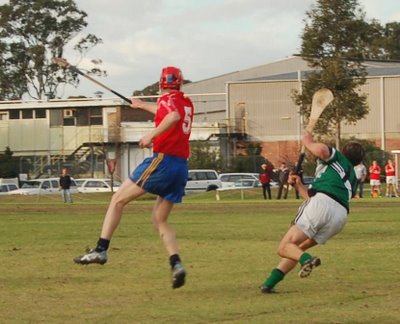

The history of hurling has its origins in ancient Irish history and is closely associated with the THE LEGEND OF CUCHULAINN .
Here is the myth as told by some Irish children:
Long ago, a king called Conor MacNessa had warriors called the Red Branch Knights. He trained them to be strong men. King Conor also had a nephew called Setanta who wanted to be a Red Branch Knight. From a very early age he showed superhuman qualities of wisdom, warfare, magic and poetry.
One night he said to his mother, "I want to be a Red Branch Knight." But she said he was too young.
Setanta was a happy child who played the game of hurling [the national sport of Ireland - like lacrosse or field hockey] with his friends. His team always won. When Setanta was ten he said to his father, "I want to join the Red Branch Knights." His father said he was still too young. So he stayed on milking cows, carrying water to his house and chopping wood.
One night a man came to the house to tell stories. He told lots about King Conor and his knights. That night, while everyone was asleep, Setanta got his hurling stick and ball and left for King Conor's castle.
It was a long trip but when he got there, a hurling match was on. Setanta joined in and the other boys did not like it because he was such a good hurler. He went to meet King Conor and King Conor said he could stay.
Some days later, the king said to Setanta, "I am going to a party at Culain's, do you want to come?" Setanta replied, "I will come later as I am playing a hurling match."
Later that night he set off. It was a long trip. He got to the fort and found a wolfhound guarding the fort. He hit the ball and killed Culain's hound. The man heard the dog's cry and ran out. He said, "I am sorry to see my dog go but glad you are okay. But who is going to guard my house now?" "I'll be your guard dog until you can replace the one I killed. I'll be the "Hound of Culain" ["CuChulain"]," said Setanta.
So that's how Cuchulainn got his name. Soon he became the best guard of all and joined the knights. He was the best Red Branch Knight ever.
Artwork and story research by Gillian Molloy & Ellen Standish,Coolderry National School, County Offaly, Ireland..
To Autumn
Season of mists and mellow fruitfulness,
Close bosom-friend of the maturing sun;
Conspiring with him how to load and bless
With fruit the vines that round the thatch-eves run;
To bend with apples the moss'd cottage-trees,
And fill all fruit with ripeness to the core;
To swell the gourd, and plump the hazel shells
With a sweet kernel; to set budding more,
And still more, later flowers for the bees,
Until they think warm days will never cease,
For Summer has o'er-brimm'd their clammy cells.
.
Sometimes whoever seeks abroad may find
Thee sitting careless on a granary floor,
Thy hair soft-lifted by the winnowing wind;
Or on a half-reap'd furrow sound asleep,
Drows'd with the fume of poppies, while thy hook
Spares the next swath and all its twined flowers:
And sometimes like a gleaner thou dost keep
Steady thy laden head across a brook;
Or by a cyder-press, with patient look,
Thou watchest the last oozings hours by hours.
.
Think not of them, thou hast thy music too,--
While barred clouds bloom the soft-dying day,
And touch the stubble-plains with rosy hue;
Then in a wailful choir the small gnats mourn
Among the river sallows, borne aloft
Or sinking as the light wind lives or dies;
And full-grown lambs loud bleat from hilly bourn;
Hedge-crickets sing; and now with treble soft
The red-breast whistles from a garden-croft;
And gathering swallows twitter in the skies.
Friday, June 23

"It is physically impossible for pigs to look up to the sky. "
This is a fact I discovered today. It's a fact that I find quite upsetting.
Wednesday, June 21
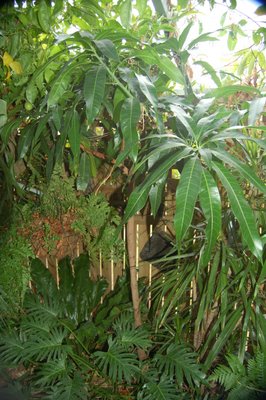
Here it is, hidden away in the jungle that is our garden.
It's only a baby tree, I know, but it's been through a lot. For the first three years I had to build a tent for it to live in so that it could survive the frosts of winter. Sydney is apparently too cold for these tropical dwellers. It has survived thunderstorms in which bigger trees have come crashing down upon it, splitting it in two. It has also survived being uprooted and replanted as life has required us to relocate. In a way, the tree symbolises my life.
Despite all the frosts, tempests, blows, and uprootings this tree has borne us fruit: sweet, delicious fruit. I can only hope that in this way, too, the tree and I will grow alike.
Sunday, June 18

On Emulating the Most Brilliant Writers.
. . Last week, I sat a literacy exam. I am sure I did very poorly and am pretty concerned that this one bad test result will send my WAM plummeting. However, in my own defense – I warn you, it is not a very good defense but it is interesting – I was distracted from study by the course content. You see, in a series of lectures we were instructed on how to teach writing and were introduced to the empirical evidence for such methods. While revising, one aspect of a particular lecture caught and consumed my attention. It was this: apparently, if you would like to know how to write successfully it may be best to, or not to, ask accomplished writers. Here is why…
. . Robert Frost chose never to use a table, and to sometimes write on the sole of his shoe, which was ok because he prefered to take the road less travelled, so I am sure his soles were clean. Rudyard Kipling wrote with only the blackest ink. Norman Mailer, somewhat picturesquely, likes to write in a long room with a view while Émile Zola preferred to avoid daylight and insisted upon closing the blinds at midday. Samuel Johnson liked to drink a lot of tea and have a purring cat and a strong odour of orange peel nearby. Apparently, Johnson is not the only writer to be inspired by the fragrance of fruit, for Johann Christoph Schiller liked to keep rotten apples in his desk while his feet were soaking in ice-cold water! Percy Bysshe Shelley and Jean-Jacques Rousseau wrote as they sat bareheaded in the sunshine while John Milton and René Descartes would lie stretched out. Finally, James Joyce asserted it was easy for him to write anywhere, as long as he was not too drunk every night.
. . I think the example of some of these writers is worth following. I can understand Kipling writing only with the blackest ink. Black ink is very nice. My Nan and I once had an argument about this: she asserted blue was the only acceptable ink for writing as black was too dark, I liked the darkness of black ink unless I was being artistic, then brown was preferable, or white on black paper, but red for whiteboards. Sunshine on one’s head would also be very nice, only I’d have to shave my head if I were to truly heed this advice. The odour of orange peel is very invigorating - I do like the smell of it infused with coffee - so I may follow the writing habits of Johnson. I, like him, also consume a lot of tea when writing, actually I don’t have to be writing to drink a lot of tea! Purring cats are also very nice, but too tempting to touch so they may prove a distraction for me. Lying stretched out works for a while but I couldn’t write an epic that way, or a treatise unless I began "I lie flat therefore I write…" As for drinking, if I were happy for my writing to be as inaccessible as Joyce’s I’m sure drinking would help. Rotten apples and ice-cold water are definitely out! And darkness is kinda scary. I could definitely write in a long room with a view, and the lack of a table does not bother me but the shoe thing…?
You can see how I was distracted…
. . I started wondering if a writer’s style is influenced by his/her writing methods. I started wondering about my own writing practices. I wondered if I should develop some quirks to improve my writing. I wondered how on earth I was going to teach writing to students: should I get them to try writing with the scent of orange peel? Should I take purring cats to school for inspiration? Should I suggest an excursion to a long room with a view?
. . I would be very interested to know if anyone out there has any particular writing quirks they believe contribute to good writing? I think I have realized that I always need to be wearing lip-gloss. As you can tell by my writing, I am not at the moment. I apologise.
Saturday, June 17
Cloud swirls in my coffee, and
I'm so vain I probably think this post is about me
I'm so vain (you're so vain)
You bet I think this post is about me
Don't I, don't I, don't I...
This great post was brought to my attention by Kim, an ever faithful blog friend! Thankyou for this link, Kim. I setting up this permanent link here so that I can read this postnow and in the future.
Thanks to Doug, at Coffee Swirls, for sharing his thoughts, too.
And lastly, thanks to Carly Simon for the theme song. What a great song!
You can hear the song at the Carly Simon link by scrolling down and selecting said song. My mum used to do the vacuming to this song! I love it!
Friday, June 16
 . . James Joyce's drawing of Leopold Bloom
. . James Joyce's drawing of Leopold Bloom
. . Well, today is Bloomsday. Happy Bloom’s Day: the day in which we celebrate Joyce’s great work Ulysses, happily? Bloom is the central character of Ulysses. The 'every[wo/]man' through which Joyce proposes a new form of heroism. A heroism that is kind to cats, pacific, loving, helpful, self abnegating, at times blundering, compassionate, forgiving and understanding. He is like all of us. Here are some passages which will introduce you to Bloom:
.
. - Mkgnao!
. . - O, there you are, Mr Bloom said, turning from the fire.
The Cat mewed in answer and stalked again stiffly round the leg of the table, mewing. Just how she stalks over my writing table. Prr. Scratch my head. Prr.
Mr Bloom watched curiously, kindly, the lithe black form. Clean to see: the gloss of her sleek hide, the white button under the butt of her tail, the green flashing eyes. He bent down to her, his hands on his knees.
. . - Milk for the pussens, he said.
. . - Mrkgnao! the cat cried.
. . They call them stupid. They understand what we say better than we understand them. She understands all she wants to. Vindictive too. Wonder what I look like to her. Height of a tower? No, she can jump me.
. . - Afraid of the chickens she is, he said mockingly. Afraid of the chook-chooks. I never saw such a stupid pussens as pussens.
Cruel. Her nature. Curious mice never squeal. Seem to like it.
. . - Mrkrgnao! the cat said loudly.
. . She blinked up out of her avid shame closing eyes, mewing plaintively and long, showing him her milkwhite teeth. He watched the dark eyeslits narrowing with greed till her eyes were green stones. Then he went to the dresser took the jug Hanlon’s milkman had just filled for him, poured warm bubbled milk on a saucer and set it slowly on the floor.
. . - Gurrhr! she cried, running to lap.
James Joyce, Ulysses, Oxford: Oxford University Press, 1993, pp53-54
. . - And I belong to a race too, says Bloom, that is hated and persecuted. Also now. This very moment. This very instant.
. . Gob, he near burnt his fingers with the butt of his old cigar.
. . - Robbed, says he. Plundered. Insulted. Persecuted. Taking what belongs to us by right. At this very moment, says he, putting up his fist, sold by auction off in Morocco like slaves or cattle.
. . - Are you talking about the new Jerusalem? says the citizen.
. . - I’m talking about injustice, says Bloom.
. . - Right, says John Wyse. Stand up to it then with force like men.
. . That’s an almanac picture for you. Mark for a softnosed bullet. Old lardyface standing up to the business end of a gun. Gob, he’d adorn a sweepingbrush, so he would, if he only had a nurse’s apron on him. And then he collapses all of a sudden, twisting around all the opposite, as limp as a wet rag.
. . - But it’s no use, says he. Force, hatred, history, all that. That’s not life for men and women, insult and hatred. And everybody knows that it’s the very opposite of that that is really life.
. . - What? says Alf.
. . - Love, says Bloom. I mean the opposite of hatred.
James Joyce, Ulysses, Oxford: Oxford University Press, 1993, pp318-319
. . And finally, Bloom, on getting into bed next to his wife whom he knows has committed adultery during the day:
. . What did his limbs, when gradually extended, encounter?
. . New clean bed linen, additional odours, the presence of a human form, female, hers, the imprint of a human form, male, not his, some crumbs, some flakes of potted meat, recooked, which he removed.
. . If he had smiled why would he have smiled?
. .To reflect that each one who enters imagines himself to be the first to enter whereas he is always the last term of a preceding series even if the first term of a succeeding one, each imagining himself to be first, last, only and alone whereas, he is neither first nor last nor only nor alone in a series originating in and repeated to infinity.
. . Assassination, never as two wrongs did not make one right. Duel by combat, no. Divorce, not now. Exposure by mechanical artifice (automatic bed) or individual testimony (concealed ocular witnesses), not yet. Suit for damages by legal influence or simulation of assault with evidence of injuries sustained (selfinflicted), not impossibly. If any, positively, connivance, introduction of emulation (material, a prosperous rival agency of publicity: moral, a successful rival agent of intimacy), deprecation, alienation, humiliation, separation protecting the one separated from the other, protecting separator from both.
James Joyce, Ulysses, Oxford: Oxford University Press, 1993, pp683 & 685
. . So today, I have been thinking about Bloom and whether I think he is truly heroic. To be honest, I’m not sure. You see I love that Bloom remains passive in the face of ugly one-eyed nationalism in the Cyclops episode, I love that Bloom helps old blind men across the road, I love that Bloom takes the bedraggled Stephen home to save him from a worse fate and show him hospitality, I love that Bloom loves his cat and buys nice soap for his wife, but I don’t like his passivity in the face of his wife’s adultery. I really don’t like it.
. . Friends have tried to convince me of Bloom’s heroism in the face of his wife’s adultery. They have asserted that considering the violence of the times, the certain destitution Molly would have faced had he kicked her out, the difficulties of their relationship, and the undesirability of a ‘silent marriage,’ Bloom’s choice not to divorce Molly was heroic. I agree, up to a point: it was compassionate and understanding of Bloom to recognise the difficulties in the marriage, to take partial responsibility for the lack of intimacy since their son’s death, and to resolve to persist in the marriage. However, he doesn’t even confront her about it! He gets into bed with the crumbs another man has left! Having experienced the pain of adultery, this image disturbs me greatly! Getting into bed with someone who has been unfaithful is a torment; it's sickening. It is like sleeping next to the "flakes of potted meat, reheated," (Ulysses, p683). It is revolting. Nevertheless, it is real. To his credit, Bloom does remove the flakes.
. . A classmate suggested that the whole novel is an interrogation of Irish nationalism. I think this view is highly probable and indeed, there is much textual evidence to support this claim. In this interpretation, Bloom would represent the kind of nationalism Joyce hoped would emerge for Ireland. A nationalism that is, like Bloom, of mixed origin, inclusive, pacific, compassionate, forgiving, interested in reconciliation, understanding, and perhaps, not unimportantly, loving towards cats. I very much admire this vision for a nation. It is a beautiful, if at times blundering, image. Still, I wish Bloom would talk to his wife! There exists between them so much in common; yet without it being verbalised they can never achieve the intimacy they both desire. It is frustrating, depressing, disheartening. Then I think, perhaps this is the bitter taste Joyce wanted to create. Perhaps a right response is to lament the fact that these two factions never resolve their differences, so that we are left with a wish for reconciliation and discussion. Perhaps this was part of his push towards inspiring a new nationalism? Perhaps.
. . Today I remember Bloom as a hopeful image of a pacific people and as a result I am both inspired and frustrated. Happy Bloomsday. Be nice to your cats! - Mrkgnao!
Thursday, June 15
Wednesday, June 14
from the sound of the Victor,
I am from the weatherboard house,
striped blinds covering glassy eyes,
hammock adorned decks,
and sun warmed lawns.
passionfruit flowers, dark cool soil,
the uncurling tendrils of tree ferns,
pungent frangipanis,
and the fresh smell of rain
before it falls.
unrelenting determination,
from Gargi and his Love,
Dadpa, Whale
and Mattaheyyou.
From little Moos and bigger Baas.
And now there is Miss V.
the sentimental.
they’re just for you:"
his Dresen china plate,
her Lady Muck.
From, "Mi lovem yu tumas,
Morning Star bilon mi,"
and "mi killem yu!"
nau em losim mi.
From, "I love you, precious mama,"
I love you, too.
I’m good enough as I am,
and "how do you know God’s real?
or, man landed on the moon?
that whosoever believes in Him will
have eternal life, but maybe lose their family.
I’m from whatever I lose is never
as much as what I’ve gained.
I’m from He holds my tears in a bottle;
And one day they’ll all be wiped away.
I’m from neither scissor throwing,
nor window barring, nor rape,
nor blows to the head,
nor theft, nor broken hearts,
nor unfaithful husbands,
will ever separate you from the love of God
which is found in Jesus Christ,
my Lord.
...Come with me.
a stolen dress, a long boat trip, a new land.
From gold panning, dairy farms,
cloud descending on mountains,
big rivers, dry grass, bushfires,
the harbour and the city,
the sun, the sand,
almond seasoned bean salad
and chicken
wrapped in basil and pancetta.
Champagne brunches that last all day,
wine, the smell of fresh coffee, and tea.
from the bed, the table,
the mirror, the clock,
the doll house, the billie carts,
the skipping rope, the tree house,
and all he made for me.
From the cadence of pedals,
the flicker of shadows,
as we ride and we ride and we never give up.
I am from the fresh produce loved into gourmet delights.
From the smell of bruised fresh herbs,
the new recipe.
as if it were their own,
because I am their own.
I am from hearts that break when mine does
because mine does.
I am from the blood that bled from my brother’s nose
when he found out they’d hurt me.
I am from running away, and being found again.
And being brought home.
I am from the laughs of children. Hugs and kisses.
Tuddles, snovicks and calluges.
I am from flower walks and fists full of daisies
bestowed with crumpled brows.
swings which make me fly through sunshine
until my feet touch the clouds.
From, scratchy knitted jumpers
and soft woolly socks,
fingers in the soil,
feet in the sand.
I am from salt water, cool, clean, clear and fresh.
Sun kissed brown skin,
salt encrusted eyelashes and sand swirled hair.
Souvenir shells, or the ‘pilfering of natural resources.’
I am from water colours and paper,
oil on board, Australian hard wood,
favourite songs.
I am from a bed covered in drawings
and kisses left under my pillow.
I am from a rambling rose, a bouquet of leaves
nailed to wood, and button grass.
If I were to be completely honest, I would probably say something like this:
I am afraid to write what I really think and feel: afraid of being judged harshly, afraid of being vulnerable, afraid of subjecting myself to public scrutiny, afraid of admitting that I get it wrong – a lot. But I am also afraid of not writing, of not saying what I really think and feel; for, to speak not of the things I think, feel and have experienced is to deny who I am and how I came to be. So here, I plan to resume my first attempt at regainingparadise. Yet, this time, if you will permit me a little more anonymity I may honestly find the courage to lay down my true history – The History of MissMellifluous.
Some have written Histories in a manner so as not to offend the exactest purity; I make no such promises. For, who can truly claim to have lived without offence? Whoever does so is a liar and has offended me at once. No, I offer no lies, no pretence, rather I will depict a real History. ‘Ah!’ you may say, ‘but you are surely not to assert that you really are Mellifluous, when it is obvious that you are not. How real can this History be?’ Indeed, my reader is clever, and right above all, for at times my words clang, and resound more like a gong than smooth sweet honey; yet this, too, adds to the verisimilitude rather than the fiction. Besides, if I am to be true and faithful to my experience and so dishevel myself before you, perhaps you will permit me to reveal my self at my discretion in my own time. Allow me this freedom and you will not, if with me you persist, be denied the deepest recesses of my soul. And who amongst you will begrudge a writer so honest the one before you the thin veil provided by a nom de plume when all else is laid bare? For those of you who have been privy to the revelation of my real name in the past, I consider you friends and ask that, out of respect for my wishes and my privacy, you hold that secret close and enable me in anonymity to endeavour to regain paradise once more.
You may ask why I would risk being subject to scrutiny for the sake of self-expression; to which I would reply: if I cannot speak, or write, I am not me. Further, I feel increasingly fettered by the ways my life has failed to meet the standards by which we measure ourselves as Christians. Much of that which I have experienced is taboo to the Christian conception of living a blessed life. Yet, I do not feel that I am not blessed, I do not feel that my experiences are part of the judgement of God on my life, I do not feel that God would make me feel guilty for the things I have lived through the way other Christians make me feel guilty, I do not feel that I am less of a Christian because my path has not been straight. I do feel an incredible sense of loss. I do feel incredibly saddened by events in my life. I do feel that it should not be taboo to speak about the instances in life that shape one’s self, one’s life, and one’s faith. I do feel abhorrence at the thought of presenting myself as someone who has it all together. I do feel like it is time to change this and break the fetters that make me feel like a lesser person because I have not ticked all the right boxes.
The idea of regainingparadise implies that at some point in the past paradise has been lost. And indeed it has; for me many times; many, many times. It implies that paradise was there to begin with. This I am not so sure of but there have certainly been glimpses. It implies that paradise may be re-found, reclaimed, re-entered, regained. This we are yet to see.
Perhaps, I must ask one more favour from my reader before I have the confidence to proceed over the rough terrain ahead. My favour is this: If at any point you find your opinions at odds with the writer, I welcome the expression of such sentiments, reproofs, rebuffs. If at any point, you feel compelled to exclaim, to laugh, to cajole, to whimper, to weep, to dance, to enact or express any impassioned response, please do. May we both have the liberty to be honest with each other. Yet, let us remember each other’s humanity and thus be gentle. Let us remember that the human heart, although resilient, is much like a beautiful crystal glass which when touched in the right manner pours forth a glorious song, or when subject to the right light paints its surroundings with magnificent rainbows, and thus being exceedingly beautiful to hold is in its delicacy likely to break, and break, and break if handled without care. And this crystal once broke remains beautiful still yet but a fragment of that which it was before its sad destruction. Then the only way in which to make it a complete object again is, well, is beyond my current comprehension, yet if it can be achieved it is certainly to be worth the effort. But please remember, the object is never the same as it was before it was shattered: perhaps fragments are lost forever, perhaps the crystal shall never sing the same way again. Perhaps, it all depends on the skill of the master artisan responsible for the reconstruction. So, let us proceed with much care for the delicacy which is laid before us.
With my intentions thus laid out, I know not where to begin and am almost tempted to abandon the task at the thought of such a mountainous climb ahead. Yet through that which has gone before I must proceed in order to press on. I so want to press on. But where does one begin? ‘At the beginning,’ you may well say with Maria, ‘For that is where all good Histories start.’ Again, you are correct. It seems that many good Histories have begun at the beginning, but I do not claim to be writing a good History. No. As my science teacher used to reply to my assertion of being ‘good’ at his enquiry as to how I was: "None of us are good, Kiddo. Just say you’re well." So, well may we proceed; But from where? It is my proposal, as has been my observation, that History is not simply found in the beginning, but also in the now. I observe this simply because that which has past comes forth and enters the present influencing the way we see, think, feel, and act. In this way, History transcends time even as it represents it. Writing in this moment, I am influenced by all that has gone before. The two are inseparable and so in this text I reserve the right to resort to anachrony should I see that the present or the past informs the occasion on which I write. Just as I am inclined to chase butterflies as they flutter by on sunny days, so I am likely to chase thoughts as they alight upon the trail on which we walk. I am sure you will not mind these seeming deviations as we must all concede that a butterfly is indeed a beautiful creature. A creature that will surely be in paradise.

Perhaps we should just share one butterfly at a time…

